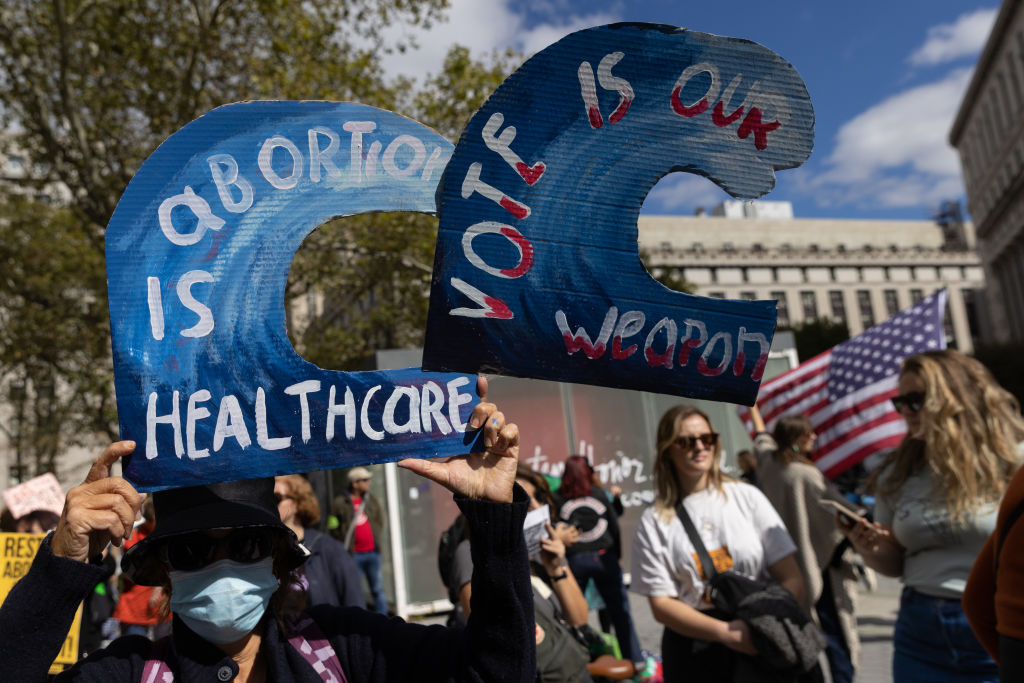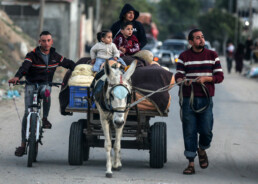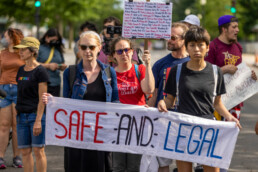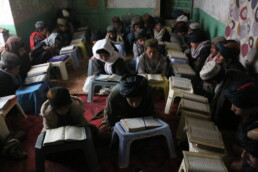Why South Africa Is Bringing a Case Against Israel
January 9, 2024NEWS,NEWSLETTER
 January 9, 2024 Hey there, Meteor readers, My new Panda Planner arrived in the mail over the weekend, and I can truly begin 2024 in earnest now that I have this oversized book to store my five different kinds of to-do lists.  In the words of Issa Rae, “I am about to be so much better. That text? Responded to. That email? Answered. That project? Finished. That other project? Started.” In today’s newsletter, we look at the charges being levied against the Israeli government, the Golden Globes, and a little bit of good news. This opener? Signed off, Shannon Melero  WHAT'S GOING ONDetermining genocide: On Thursday, the International Court of Justice in the Hague will begin hearings on the question of whether the Israeli government is guilty of carrying out genocide against Palestinians since the Hamas attack on October 7. The case, brought to the ICJ by South Africa, could be the first step in establishing a long-lasting ceasefire since a portion of the suit requests that certain immediate provisions—including a suspension of Israel’s campaign in Gaza—be made by the court. (Both Israel and the United States have called the suit “meritless.”) While it may seem odd that South Africa, a country with no obvious skin in the game between Hamas and Israel, would bring such a suit, the African National Congress has been a supporter of Palestine for decades (due to its own well-known history of enduring and eventually ending apartheid, the same policy that the United Nations has said Israel is carrying out in the Palestinian territories). Any territory that is a member of the United Nations and agrees to its treatises and jurisdiction can bring forth a suit against another member nation. And both South Africa and Israel are signatories of the 1948 Genocide Convention, which prohibits any signing nation from committing genocide. (The U.S. is also a signatory.) But while this case could prompt a ruling on whether or not Israel broke the treaty and committed genocide, it is not a criminal case and thus cannot dole out punishment for war crimes, something that would have to be decided by the International Criminal Court. Also worth knowing: South Africa’s suit focuses on military actions carried out against non-combatant groups—chief among them children—over the course of years. The lawsuit cites findings from the UNHRC’s 2019 Independent Commission of Inquiry, which found “reasonable ground to believe” that Israeli snipers “‘intentionally shot’ children knowing them to be children” as well as health workers and journalists. It also cites the disproportionately high deaths of journalists over the last two months illustrating that, “Palestinian journalists are being killed at a rate significantly higher than has occurred in any conflict in the past 100 years.” Looking for a quick decision on all this? Don’t. Hearings begin this Thursday and will continue into Friday, but those “prima facie” proceedings will only decide whether the case goes forward at all, and whether provisional measures can be implemented. That’s important—those measures could lessen the severity of the situation within a matter of weeks while the ICJ continues to deliberate—but an ultimate determination about the genocide classification will take years. ALSO IN THE NEWS AND:

 TELL ME SOMETHIN' GOOD 🎶
 FOLLOW THE METEOR Thank you for reading The Meteor! Got this from a friend? Subscribe using their share code or sign up for your own copy, sent Tuesdays and Thursdays.
|
![]()
"I've never seen anything like this"
January 4, 2024NEWS,NEWSLETTER
 January 4, 2024 Hey there, Meteor readers, My Christmas tree is still up and I feel no shame about that. So if you, too, are a delayed tree remover, I see you and I love you. In today’s newsletter, we look at the devastating food crisis in Gaza. Plus, Claudine Gay speaks for herself, a big week for lawsuits, and your weekend reads. Lazily yours, Shannon Melero  WHAT'S GOING ONStarving to death: In late December, the United Nations released a report detailing “acute food insecurity” throughout Gaza. At the time, reporters found that more than 90 percent of the over 600,000 people living in the Gaza Strip were starving. At least 335,000 children were at risk of “severe malnutrition and preventable death,” according to the report. As we enter the fourth month of Israel’s bombardment of Gaza, the “entirely manmade…preventable catastrophic” food conditions are worsening. In an interview with The New Yorker’s Isaac Chotiner, Arif Husain, the chief economist at the United Nations World Food Program, described the situation as unprecedented. “I’ve never seen anything like this in terms of severity, in terms of scale, and then in terms of speed,” he says. Husain notes that the main contributing factor to the food crisis is inadequate and inaccessible aid. “On a good day, aid groups are bringing in maybe twenty-five to thirty percent of what [Gazans] need,” he told Chotiner. And the constant bombings and ground invasions by the Israeli military mean that even that small percentage doesn’t get properly distributed. All in all, Husain says 577,000 people in Gaza are classified as “I.P.C. Phase 5, meaning a catastrophic type of hunger.” That number accounts for 80 percent of the total global I.P.C. population. This degree of intentional starvation is also considered a war crime. The Rome Statute of the International Criminal Court classifies “the deprivation of access to food and medicine, calculated to bring about the destruction of part of a population” as a “crime against humanity.” As Husain makes clear, “[Aid] needs to go to where the people are. And I don’t know how you can do that without a humanitarian ceasefire.” ALSO IN THE NEWS
  WEEKEND READING 📚On ice: The Professional Women’s Hockey League is in its inaugural season and is already breaking attendance records. Could this be the league that lasts? (The Athletic) On the frontier: Pregnancy care in rural areas across the U.S. is dwindling, and those most at risk are Indigenous infants up against a congenital syphilis crisis. (Vox) On screen: Yet another lawsuit has come out against the production companies behind Love is Blind. What the hell’s going on over there? (The Cut) FOLLOW THE METEOR Thank you for reading The Meteor! Got this from a friend? Subscribe using their share code or sign up for your own copy, sent Tuesdays and Thursdays.
|
![]()
A "Long History of Exclusion" Continues
 January 2, 2024 Hey Meteor readers, Happy New Year to you all! May we all enter 2024 with the same energy as Survivor icon Parvati Shallow, who ended 2023 by coming out and hard-launching her relationship with comedian Mae Martin. Congratulations on finally flirting with women for real this time, Parv. Not to steal anyone’s thunder but I also had a monumental entrance into this new year—I spent two days playing board games and beating my mom at our new favorite two-player, Qawale.  In today’s newsletter, we ease back into everything with a quick tour de news and, of course, a few resolutions. New year, new knitting, Shannon Melero  WHAT'S GOING ONStepping down after six months and two days: Claudine Gay, the first Black person and second woman to serve as president of Harvard, announced today that she would be resigning after only six months—the shortest tenure in Harvard’s 388-year history. Gay’s time in office was marred by a Congressional hearing on anti-semitism—in which she was criticized for an answer about freedom of speech—and accusations of plagiarism in her earlier work. (Although 800 Black alumni wrote a letter in support of Gay after her Congressional testimony, many donors, predominantly white and wealthy, had called for her ouster.) Representative Elise Stefanik, who led the charge on questioning Gay, took joy in the resignation, writing on Xwitter today that she “delivers results” and calling Gay’s responses during the hearing “morally bankrupt.” (It’s worth noting that Rep. Stefanik is not exactly an objective party here: After January 6, she was removed from the advisory committee of Harvard’s Kennedy School for her 2020 election conspiracy theories.) While the plagiarism charges against Gay are still unfolding, one struggles to find justice in her departure, especially on the heels of the Supreme Court’s death blow to affirmative action. Harvard itself lamented the “repugnant and in some cases racist vitriol” Gay had faced after the hearings. And most likely some of that vitriol came from within the college community: As the old saying goes, you can’t put out a fire from inside the house, and Harvard’s old “long history of exclusion,” as Gay said in her inaugural address, runs centuries deep. As for Gay, she put it this way: “When my brief presidency is remembered, I hope it will be seen as a moment of reawakening to the importance of striving to find our common humanity — and of not allowing rancor and vituperation to undermine the vital process of education.” If only. AND:
 IN 2024 WE RESOLVE TO...Everyone’s making their lists of things they hope to do in the new year. Here’s what your favorite newsletter writers are aiming to accomplish: This year, I will: Let love destroy me. Listen, time is imaginary and separating it by years is arbitrary. We all know this. That said: 2023, you were an evil little prick, and I'm so glad your career is over. Last year took my dad, took my nephew, took my health, almost took my life—and more! And with each new loss, as I bravely and nobly held myself up on my own two feet, I thought, “This sure would be easier with more feet.” So fuck it. This year, I'm not waiting to “be in a good place” before finding someone. I'm opening myself to love, and when it finds me, I'm gonna let it hit me like a semi-truck. Basically, what I'm trying to say is: You can DM me on Twitter. (References available upon request). –Bailey Wayne Hundl. This year, I will: Stop questioning my own judgment. You would think by now, I’d have more faith in my thoughts and reasonings, but despite having been a journalist for almost 20 years, I sometimes question myself to the point where I find it challenging to make decisions. My boyfriend says my love language is processing. And yes, I think having conversations and weighing options and other opinions is extremely important (especially in my line of work). But this year, I’m going to try something new. I’m going to make a judgment and believe in myself. (I guess this is also my way of saying, I’m usually right so you should stop trying me!!) – Samhita Mukhopadhyay This year, I will: Touch grass. For my entire life, the great outdoors has been presented to me as a “white people” thing. We don’t camp or hike or snowboard or fish or enter the woods—only white people do that. But over the last few years, I’ve been deprogramming the belief that as a person of color, I should be relegated to only one kind of outdoor space (the beach). So in 2024, you can literally catch me outside hiking more, teaching my baby how to walk in the woods, learning outdoor skills, and prepping for my 2026 goal—I’m a Taurus, we plan ahead—of hiking across three states on the Appalachian Trail. –Shannon Melero  FOLLOW THE METEOR Thank you for reading The Meteor! Got this from a friend? Subscribe using their share code or sign up for your own copy, sent Tuesdays and Thursdays.
|
![]()
Your Favorite Stories of 2023
|
Happy almost New Year, Meteor readers, We hope you enjoyed your Festivus/Christmas/winter solstice/full moon in Cancer—or just a general weekend in December if none of these resonates with you. Before we roll into 2024, we wanted to take a look back at some of your (and our) favorite stories of the year. As part of our United States of Abortion series, journalist Neda Semnani spent four months investigating the story of Lauren Smith, a South Carolina woman facing a 10-year prison sentence for smoking marijuana while pregnant. Smith’s story—and the legal obstacles before her—illustrated the nefarious nature of fetal personhood laws in the post-Dobbs era.  A year after the death of Mahsa Amini, a revolution in Iran was still taking shape. Filmmaker Geraleh Kiazand spoke to women fighting for their lives and the lives of all Iranians. “People want stability,” one teen told Kiazand. “They want a good economic situation. A few nights ago, one of my friends told me to go to the embassy for immigration. I said that the future is here; we just have to build it.”  Before influencing became a six-figure industry, we had Ree Drummond and her humble coffee cake recipes. But it’s been 15 years since then, and the “mamasphere” has changed. What does that tell us about motherhood? Kathryn Jezer-Morton had the answers.  It’s hard to cast our memories back this far but there was a World Cup this year, and in the blink of an eye, it turned into a globally televised course in sexual harassment 101. We dug into the history and cultural significance of the Spanish Women’s National Team battle with their federation’s president.  We know what the Netflix algorithm wants you to watch.  This final one’s not a story, but it IS a podcast, and in this episode, hosts Susie Banikarim and Jessica Bennett explore the uniquely American genre that is Hallmark holiday movies. Small town boys, big city girls, mistletoe, weirdly retrograde plots? They’ll explain it all. Enjoy. As always, we are so grateful that you chose to spend part of your 2023 with us, and we can’t wait to see what calamities, gifs, wild stories and, yes, joy 2024 brings. Let’s make it a good one. See you in January, The Meteor Team  FOLLOW THE METEOR Thank you for reading The Meteor! Got this from a friend? Sign up for your own copy, sent Tuesdays and Thursdays.
|
![]()
No One Grieves Alone
 December 21, 2023 Beloved Meteor readers, Over the last few months of this year, a question has been kicking around my brain like a Victorian ghost on the Yorkshire moors—and maybe you’ve been asking yourself the same thing: What does it mean to find joy in a time marked by such unimaginable sorrow? I probably don’t need to explain the extent of the global tragedy, but for starters: the ongoing war in Ukraine; the worsening living conditions for people in Afghanistan and Iran; the concurrent humanitarian crises in Sudan, the Democratic Republic of Congo, and, of course, Gaza; the extreme weather events that have displaced millions. All the while as these tragedies unfolded, those of us who had the privilege of distance were asked to do one thing: bear witness. It was the least we could do, and yet, I felt guilty every time I chose to look away and take a “break” from the endless barrage of devastating news. But it was a personal tragedy this year that forced me to face a grief I couldn’t avoid. While walking home one night in July, my dear friend Anthony Gonzalez had a verbal altercation with a young man. After a heated exchange, the young man pulled out a gun and shot Anthony in the head. I learned about the shooting the next morning. I remember that day with haunting clarity. My five-month-old hadn’t slept all night, and I had spent the early hours irritated, arguing with my husband while he was at work. When he got home, all he could manage to say was, “They shot him.” Anthony had been rushed to the hospital. No one seemed certain of his condition, and visiting hours wouldn't start until late afternoon. Even if we could get in to see him early, we lived in a different state; we needed to know what was happening immediately. I called my mom, who still lives in the Bronx and could get to the hospital sooner. She was on her way to work. “There’s been an accident. Don’t get on the train,” I told her.  (FROM LEFT TO RIGHT) ANTHONY, MY MAMA, ME, MY HUSBAND AT AN OBSTACLE COURSE RACE IN 2016. ANTHONY HATED RUNNING BUT HE HATED MISSING OUT ON SOMETHING FUN MORE. Hours later, baby in tow, we made it to the hospital where my mom was waiting along with hundreds of Anthony’s family, friends, and co-workers from Local 28, the Tin Knockers union. The lobby was so crowded, I heard a nurse ask if someone famous had been admitted. Anthony was so annoyingly charming—of course he would draw a crowd. “Wait ‘til I tell him how many people are down here,” I remember thinking. A family friend who worked at the hospital (the Bronx can be small) took me to see him. “It’s not good, mami,” he told me quietly in the elevator on the way. And he was right. There were so many tubes and wires coming out of Anthony’s body—and the dried blood on his bandaging was deep blackish-green. A few days later, the call came in from a friend who was at Anthony’s bedside—he was medically brain dead. His organs were to be donated and the machines keeping his heart beating would be turned off. We didn’t want to believe it. To anyone following the local news, Anthony was just another faceless victim of gun violence. He was a statistic. But Anthony was a person. He was a son, a father, a brother, a friend—the type of guy who went out of his way to take care of others. He and my husband had been a dynamic duo for 20 years. When I first met my husband, Anthony was there. When we got married, Anthony was there. He was so much a part of us that I called him my sister-wife. (Or, as I joked on Instagram once: Anthony was first wife in the streets, but I was first wife in the sheets.) When I got pregnant, Anthony would ask, “How’s my niece?”  (FROM LEFT TO RIGHT) ME, MY ARCH NEMESIS WHO I LOVE AND DEPLORE WITH THE FIRE OF 1000 SUNS, MY HUSBAND, FREDDY, AND ANTHONY AT MY ENGAGEMENT PARTY IN 2018. After his death, I pushed my grief as far down as I could manage, piling everything else in my life on top of it. I was a new-ish mom in the middle of buying a house and trying to focus on the “more important” work of covering the bigger things going on in the world. It felt selfish to be caught up in my own sadness when there are things that feel so much worse happening in the world—mass killings, mothers holding their babies for the last time, families separated, houses destroyed. In the face of all that, my pain felt insignificant. But the more room I made for others in my heart, the more empathy and anger I felt for their injustices, the more apparent it became that I was a fool for trying to minimize my own personal loss. There is nothing bigger than the loss of life—even if it’s just one life. When we read the headlines about masses of people losing their lives and homes, we become blind to the reality of a single person and what their life meant. The news cycles can obscure a person’s humanity. Turn them into a number. Anthony’s obituary couldn’t capture who he truly was, how much his mother and child loved and depended on him. But those things were true, just as they are true for every one of the millions of people taken too soon this year. It took the world imploding to make me understand that mourning one person was just as valid and necessary as mourning thousands. And pushing away my personal grief in exchange for communal grief meant I was also pushing away from another feeling, one that I needed to make sense of Anthony’s loss: joy. Anthony oozed joy. (He also oozed Hennessy, and I never missed an opportunity to tease him about it.) He wanted to make people laugh. He loved all of us so fiercely, even when it was hard. He was simultaneously the most dependable and flakiest person on earth. He’d be the first person to bail you out of jail, but if you asked him to show up on time for Christmas dinner? You’d have better luck seeing a flying reindeer. It can feel impossible to find joy in this moment—especially if, for one reason or another, you feel like you don’t deserve to be happy. In a piece about how the war in Gaza has been documented on Instagram, Zaina Arafat wrote in New York Magazine that she searches for signs of normalcy amid the destruction. Her uncle's Gazan wife once told her, “During Gaza’s many wars, people would often go to the beach after a bombing to celebrate the fact that they were still alive. Joy is its own form of resistance. It allows people to sustain.” I echo her sentiment. My sorrow was debilitating, and there are moments when it still is. But then, I see the pictures on my refrigerator of me, my husband, and Anthony embracing each other and making silly faces at a wedding, and I feel grateful to have that memory.  ONE OF THE PHOTOS ON MY FRIDGE OF THE THREE OF US AFTER [REDACTED] SHOTS. There’s a line in the Quran that says, “Verily with hardship comes ease.” And a similar line in the Bible: “Weeping may endure for a night but joy cometh in the morning.” Many of us have not made it to our ease. I know I haven’t. But joy? It can find its way to us every time we open our eyes. So, with a hurting heart, I ask you to join me in the toughest end-of-year challenge: choose joy. Choose the joy of fighting instead of the sorrow of defeat. Choose hope over hopelessness. Choose joy so often that it emanates from within you, and you can share it with others. Beyond all of the horrors we’ve seen is a day of healing. A day of telling our stories and ending them with something good. I hope to meet you all there. -Shannon  FOLLOW THE METEOR Thank you for reading The Meteor! Got this from a friend?
|
![]()
The Pope's Declaration May Feel Late...But It's Still Important
December 19, 2023NEWS,NEWSLETTER
 December 19, 2023 Ho, ho, ho, Meteor readers, Only a few more days ‘til Christmas, and I, for one, am very much looking forward to cooking my family’s ancestral holiday dinner, passed down to me by generations of Puerto Rican women: lasagna. In today’s newsletter, Phill Picardi helps us make sense of Pope Francis’s latest announcement—plus, a new bill to save books and a touch of, yes, good news. No-boil noodles for the win, Shannon Melero  WHAT'S IT REALLY MEAN?Yesterday, Pope Francis issued a declaration stating that priests are now allowed to bless same-sex couples. There is, of course, a caveat: The blessings must be in line with the teachings of the Catholic Church. This means that while those couples can be blessed, they still cannot receive the sacrament of holy matrimony, and their marriages cannot be formally recognized by the Church. Still, this is a bold step forward for Francis, who has been fending off conservative attacks from within the Vatican walls and, in the U.S., the overall influence of the political right. How happy should or shouldn’t we be about this? We knew exactly who to ask: Meteor collective member Phillip Picardi, who is both the CMO of the LA LGBT Center and a graduate of Harvard Divinity School. What does this new document from the Vatican mean for the LGBTQ+ Catholic community? Phillip Picardi: This is the rare headline about Christianity and LGBTQ+ people that doesn’t involve violent protests, book bans, or the rollback of basic civil rights. Instead, this is the Pope—who’s believed by Catholics to be the divinely ordained Head of the Church—telling his global clergy that they can bless LGBTQ+ couples. This is a massive turnaround, considering the Church’s hard-nosed stances on gay adoption, same-sex marriage, trans rights, and even safe sex practices around HIV/AIDS. Now, while a blessing isn’t going to solve the issues facing our community, it can’t hurt. Religious-based discrimination is a huge issue for the LGBTQ+ community—in fact, many of the youth who end up seeking housing with the LGBT Center [have been] kicked out of their homes for reasons related to religion. If this starts to change some of that harmful rhetoric, it can be significant. The declaration makes a point to distinguish between allowing same-sex couples a blessing rather than allowing them to receive the sacrament of matrimony. What’s the difference between these two things? Sacraments are the ways a Catholic moves through their journey within the church throughout their life. They’re liturgical sacraments, which means that they hold a certain rigor within the structure of the Church. Catholicism is very big on making sure Catholics have been educated and prepared before receiving these sacraments because, in a sense, they’re also a reception of God. A blessing is a much more casual acknowledgment by a clergy member; it doesn't hold the same liturgical rigor. Pope Francis, with this order, is trying to make it so that Catholic priests feel comfortable giving blessings to folks, even though they may not know about their moral litmus test. Before, getting a blessing from the Church was something that the Vatican said you needed to be somewhat morally pure or prepared for. So, he's removing this idea that there needs to be a moral exam for someone to receive a blessing or acknowledgment from the church. Is this a big step forward? Or not big enough? I think that depends on your own relationship to faith. If you are not Catholic, a move like this from the Pope can seem inconsequential or rudimentary—a small spiritual concession to make. And I think that can be a fair assessment considering how far other faith traditions have come on LGBTQ+ issues. On the other hand, if you are Catholic and know about the history of the Church, this can feel massive. Pope Francis is breaking with centuries of tradition that have seen the Church further marginalize and harm LGBTQ+ people. He’s also issuing this sort of “spiritual executive order” at a time when the Catholic church is, unfortunately, tilting even farther towards the right. The Pope has the power to change how Catholics look at their neighbors or how a parent looks at their child. Even for LGBTQ+ Catholics—because it’s estimated that at least half of our community is religious!—this is significant. It can feel like an opportunity for healing or reconciliation after a lifetime of religious-based trauma, after feeling abandoned by a church community or even by God. And if this is the beginning of that change—then this is a positive step in the right direction. ALSO IN THE NEWS
 TELL ME SOMETHIN' GOOD 🎶

 CLICK THE LINK ABOVE TO GET YOUR UNIQUE SHARE CODE TO SEND TO A FEW FRIENDS. IF FIVE OF THEM SIGN UP FOR THIS NEWSLETTER, YOU GET A METEOR TOTE! ALREADY HAVE A CODE BUT CAN'T FIND IT? NO WORRIES, IT'S WAITING FOR YOU DOWN BELOW ⬇️
 1 Any promises of children being exchanged for goods and services are not legally binding. FOLLOW THE METEOR Thank you for reading The Meteor! Got this from a friend? Subscribe using their share code or sign up for your own copy, sent Tuesdays and Thursdays.
|
![]()
Where the abortion fight is headed
 December 14, 2023 Felicitations, Meteor readers, ICYMI, yesterday was a national holiday, and if you did not receive paid time off from your employer, make sure to send your HR department an email letting them know you’ll be OOO tomorrow to make up for the missed observance. (It was Taylor Swift’s birthday.) In today’s newsletter, journalist Susan Rinkunas gives us an in-depth preview of what we can expect in the fight for abortion for 2024. Also, Oprah’s weight is once again a national conversation, I stress some small stuff and, of course, a little weekend reading. Waiting for Taylor to watch the Marilyn-Monroe-style Happy Birthday video I sent her, Shannon Melero  EYES ON 2024Why legislative decisions will matter more than ever in the second year since Roe was overturnedBY SUSAN RINKUNAS  THIS PROTEST SIGN IS A YEAR OLD AND YET STILL RELEVANT. (PHOTO BY JEENAH MOON VIA GETTY IMAGES) It has been nearly 18 months since the Supreme Court overturned Roe v. Wade, and the impact of the laws that have come to life since have had devastating consequences for pregnant people. One after another, we’ve read awful stories of patients being rushed to the ICU with sepsis, nearly bleeding out in bathrooms, or having to go out of state for abortions when their fetuses don’t have skulls. Amid all this news, it can be hard to pinpoint a bright spot, but there is one: Support for abortion has repeatedly won elections. In what would have otherwise been a sleepy off-year of races, voters were so furious about their rights being taken away that they re-elected a Democrat as Governor in Kentucky, codified abortion in Ohio, and flipped a chamber in Virginia, blocking a ban there. Republicans know their plan to ban abortion in every state is toxic with voters, so they’re trying to deceive people from their end goal. It’s why we’ve seen conservative hand-wringing over the label “pro-life,” attempts to deflect with transphobia, and, yes, even backing away from the word “ban” in favor of “limit” or “minimum standard.” But, according to Ryan Stitzlein, vice president of political and government relations at Reproductive Freedom for All, voters have shown a sustained fury over the abortion access crisis, and it stands to reason that they’ll keep it up. A major problem, however, is that our democracy isn’t the most democratic, and the majority doesn’t always prevail. (See: 2016.) Amid all the righteous anger, there’s a lurking threat that a Republican president could ban abortion nationwide. “This is not us being ‘hysterical.’ This is real,” Stitzlein says. “They're not going to stop until they've completely banned abortion.” As we close out another year of egregious cutbacks to abortion access, here’s what we can expect in 2024.  IN OTHER NEWS
SWEATIN' THE SMALL STUFFSometimes it's the other news that sticks in your craw. Or maybe it's just me?
  CLICK THE LINK ABOVE TO GET YOUR UNIQUE SHARE CODE TO SEND TO A FEW FRIENDS. IF FIVE OF THEM SIGN UP FOR THIS NEWSLETTER, YOU GET A METEOR TOTE! ALREADY HAVE A CODE BUT CAN'T FIND IT? NO WORRIES, IT'S WAITING FOR YOU DOWN BELOW ⬇️
 WEEKEND READING 📚
 FOLLOW THE METEOR Thank you for reading The Meteor! Got this from a friend? Subscribe using their share code or sign up for your own copy, sent Tuesdays and Thursdays.
|
![]()
A Crucial Year Ahead for Abortion Access
A home for modern feminism
Why legislative decisions will matter more than ever in the second year since Roe was overturned
BY SUSAN RINKUNAS

It has been nearly 18 months since the Supreme Court overturned Roe v. Wade, and the impact of the laws that have come to life since have had devastating consequences for pregnant people. One after another, we’ve read awful stories of patients being rushed to the ICU with sepsis, nearly bleeding out in bathrooms, or having to go out of state for abortions when their fetuses don’t have skulls.
Amid all this news, it can be hard to pinpoint a bright spot, but there is one: Support for abortion has repeatedly won elections. In what would have otherwise been a sleepy off-year of races, voters were so furious about their rights being taken away that they re-elected a Democrat as Governor in Kentucky, codified abortion in Ohio, and flipped a chamber in Virginia, blocking a ban there.
Republicans know their plan to ban abortion in every state is toxic with voters, so they’re trying to deceive people from their end goal. It’s why we’ve seen conservative hand-wringing over the label “pro-life,” attempts to deflect with transphobia, and, yes, even backing away from the word “ban” in favor of “limit” or “minimum standard.”
But, according to Ryan Stitzlein, vice president of political and government relations at Reproductive Freedom for All, voters have shown a sustained fury over the abortion access crisis, and it stands to reason that they’ll keep it up. A major problem, however, is that our democracy isn’t the most democratic, and the majority doesn’t always prevail. (See: 2016.) Amid all the righteous anger, there’s a lurking threat that a Republican president could ban abortion nationwide.
“This is not us being ‘hysterical.’ This is real,” Stitzlein says. “They’re not going to stop until they’ve completely banned abortion.”
As we close out another year of egregious cutbacks to abortion access, here’s what we can expect in 2024.
Abortion policy duked out at the state level
As advocates long warned, the fight for abortion is playing out at the state level and in the courts. There are now 16 states with near-total bans on abortion after laws took effect in Indiana and North Dakota this year, and another four states ban the procedure at 15 weeks of pregnancy or earlier. State lawmakers have the opportunity to block restrictions, pass protections for patients and providers, or even introduce messaging bills on abortion that inform people about threats they face, says Jennifer Driver, senior director of reproductive rights at the State Innovation Exchange (SiX) Action.
Criminalization of providers and patients
In response to threats against telemedicine providers, legislatures in states where abortion is protected are passing “shield laws” to legally protect providers who treat patients across state lines. Still, Driver says those laws are untested as of yet. As for the criminalization of patients, the Nevada legislature could repeal its ban on self-managed abortion, she says—it’s the only state with such a ban left on the books. However, prosecutors can and do weaponize other statutes to criminalize people for behavior during their pregnancy or for pregnancy loss.
Insurance fights
Lawmakers in states like Colorado, New Jersey, and Rhode Island are also doing what they can to expand insurance coverage of abortion, whether through Medicaid or by requiring private insurance plans to cover the procedure without cost-sharing, says Kimya Forouzan, principal policy associate for state issues at the Guttmacher Institute. But it’s not all smooth sailing. In Michigan, one Democrat’s objection to Medicaid coverage effectively ended that effort. Still, the state was able to end the requirement that people with private insurance purchase a separate coverage rider for abortion.
Crisis pregnancy centers
Forouzan says protective states are also moving to regulate anti-abortion crisis pregnancy centers under deceptive advertising statutes, but anti-abortion advocates have sued on First Amendment grounds. Those lawsuits could move their way through the court system in 2024. Conservative states will continue to funnel money and tax credits to CPCs, the vast majority of which offer no legitimate medical care.
Travel bans
In conservative states, the next frontier in the fight against access is restricting travel, Driver says. Idaho passed a law banning people from taking minors out of state for abortions without parental consent, and conservative activists like Jonathan Mitchell and Mark Lee Dickson have been working at the city and county level to try to ban people from driving abortion-seekers on Texas highways to appointments out of state. These attacks seem blatantly unconstitutional, but Forouzan notes that judges don’t need to uphold the ordinances for them to cause harm. “For many people who are trying to access abortion care, hearing that travel is banned or even just vaguely hearing that they could get in trouble or become criminalized for it is enough to dissuade people to not seek care,” she says.
Overlap with anti-trans rhetoric
Forouzan says we can expect to see more politicians connect attacks on abortion access to attacks on gender-affirming care. She cites as examples how Nebraska lawmakers first failed to pass a six-week ban but then later attached a 12-week ban to a bill banning affirming care for transgender youth. And in Ohio, opponents of the ballot measure tried to claim it would protect gender-affirming care.
Local elections and ballot measures
State legislators—who determine the fate of many of these laws—will be up for re-election next fall. Arizona will be a big state to watch that could flip to Democratic control. (The state has a 15-week ban in place, but a Democratic governor.) Driver predicts more candidates for state houses will lean into abortion in their campaigns like they did in Virginia this year. “This was the first time that I had seen candidates actually position themselves against their opponents by saying ‘I am the person that is going to protect access,’” she says. She’ll also be watching to see if conservatives in tough races double down on abortion or backtrack from the issue to try to keep their jobs.
Court appointments will also be crucial: It’s possible access could be fully restored in Wisconsin in 2024, thanks to a Democrat flipping control of the state Supreme Court earlier this year. In Florida, where the Governor appoints state Supreme Court justices, an impending ruling could slash the window of access down from 15 weeks to six—it would be a gigantic blow to the Southeast. There will be many other crucial state races for Governor and Attorney General—electeds who choose whether to sign or veto bills into law and how to enforce them.
And, yes, there are pro-choice ballot measures in the works in about 12 more states for 2024—including in states with active bans—where voters could make a difference. Surely, the victory in Ohio rattled the anti-abortion side: It was the seventh pro-choice victory since the Dobbs decision, and the first affirmative vote in a red state. Already, Ohio lawmakers started scheming ways to weaken it.
Continual erosion of democracy
We could see states use the coming legislative session to try to restrict the citizen-led referendum process by ending it altogether, raising the threshold for passage, or exempting abortion from statewide votes, Driver says. There’s a connection between the erosion of both democracy and abortion rights—bans pass in gerrymandered legislatures. These most recent efforts are “a sign that anti-abortion leaders are really ready to reject the will of the people,” she says.
The national fight to protect access

Stitzlein says ballot measures can be “hugely impactful,” but the threat of a nationwide ban still exists. To fix the abortion crisis in the U.S., there needs to be a federal law protecting access to the procedure. The way to do that, he says, is to re-elect Joe Biden and send him Democratic majorities in the House and Senate. Candidates need to run pro-actively on the message of codifying abortion rights and remind voters in states like Ohio that the work isn’t over.
“Reasonable” Republicans
We’re already seeing GOP presidential candidates shift to a faux-moderate position, and Stitzlein expects it to continue as candidates up and down the ballot try to hide their ultimate goal: banning abortion everywhere. Voters will be hit with a barrage of messaging from Republicans who swear that there won’t be a nationwide ban—either because a ban won’t pass Congress, like Nikki Haley and Ron DeSantis have claimed, or because abortion should be a state issue, as Kari Lake said in a recent reversal of her position. These are, of course, gigantic lies spun out of political desperation. “The fact that you have people like Donald Trump and Kari Lake—of all people—trying to present themselves as moderates on abortion is demonstrative in and of itself of just how toxic this issue is,” Stitzlein says.
Banning abortion without Congress
Contrary to what multiple Republican candidates have said, legislation isn’t the only way a GOP President could ban abortion in 2025. They could simply direct the Department of Justice to enforce the Comstock Act of 1873, a zombie anti-vice law that prohibits mailing items used for abortion. The law is still on the books but wasn’t enforced while Roe stood. Now, conservative groups, including the Heritage Foundation, are urging a potential GOP administration to invoke the law to ban the mailing of abortion pills, though Comstock could be used to end all abortions. So, yes, there’s a world in which Trump wins in 2024, doesn’t have enough Senate votes to pass a law, but can ban abortion regardless.
The impact of Trump judges
If Biden wins but Democrats lose the Senate, it’s unlikely he’d be able to nominate federal judges or fill any potential Supreme Court vacancies. It’s worth repeating that the reason Roe was overturned and we’re facing the threat of a nationwide abortion ban is because Trump appointed three justices in a single term.
A legacy of the Trump administration is packing the court system with far-right activist judges, Stitzlein says, and there’s no more significant example than Judge Matthew Kacsmaryk in Texas. Kacsmaryk ruled in April to revoke FDA approval of the abortion pill mifepristone, and the Supreme Court just decided to hear the case. That lawsuit is another threat flying under the radar, Driver says. “I’m having to remind [state] legislators this case is still happening,” she says. “The everyday person is not following along.” Kacsmaryk is the judge in two other cases, one that could bankrupt a Planned Parenthood affiliate in Texas (and possibly the entire organization), and another that could imperil birth control access for minors at federally-funded clinics. Even if Biden wins, these lawsuits—and all those Trump judges—aren’t going anywhere.
Be mad, stay mad
“We’ve seen this huge surge in turnout every time abortion has been on the ballot, and we expect that to continue to grow in intensity the longer we’re in this crisis,” Stitzlein says. But U.S. voters have a lot of reasons to be mad, including the high cost of living, ongoing wars, and lack of progress on climate action and student loans. There’s still a chance that abortion rage might not be enough to keep authoritarians out of office. After all, Biden only beat Trump in the Electoral College by 44,000 votes in three states. About a year out, it’s not impossible to imagine that vote margin evaporating and the rights of millions of people along with it.

Susan Rinkunas is a reporter covering abortion, reproductive health, and politics. Her work has appeared in Jezebel, The Guardian, Slate, NBC News, Elle, and more.
Kate Cox Should've Had a Choice
December 12, 2023NEWS,NEWSLETTER
 December 12, 2023 Greetings, Meteor readers, I know that it’s not cool to scold people, but some of y’all deserve it. Stop sending money to George Santos on Cameo! It was funny when he was lying and scamming his way around Congress, but this man should not be profiting off his nonsense to the tune of $174,000. Honestly, if you want to pay that much to have someone sassy insult your friends, I’ve got a Venmo account, way better lighting, and have never been expelled from Congress. In today’s newsletter, we read between the lines of Texas’s Supreme Court ruling against Kate Cox. Plus, a ceasefire in the Congo and a reprieve for children apprehended at the U.S. southern border. Reminding you Santos Cameos are not in your budget, Shannon Melero  WHAT'S GOING ONAn inhumane ruling: The story of Kate Cox, a Texas woman who sued, won, and then eventually lost her fight to obtain an abortion in her state has dominated the headlines over the last few days. So what makes this case such a huge story? Let’s start from the top. Kate Cox found out in November that her pregnancy was doomed. During an NIPT screening (between 10-13 weeks) meant to determine the sex of the fetus, Cox’s doctor found markers that the fetus was at high risk for Trisomy 18, “a condition with a very high likelihood of miscarriage or stillbirth and low survival rates.” Despite these initial results, Cox remained hopeful and underwent further testing, which only revealed worsening conditions for her fetus, including irregular skull and heart development, a twisted spine, and a neural tube defect. A specialist told Cox that in the best-case scenario—if the fetus managed to survive labor—it would only live for a week. Cox was devastated. Not only was her pregnancy not viable, there was a chance carrying it to term would impact her ability to conceive in the future. And yet, she was told by her medical professionals that she didn’t meet the legal threshold to obtain an abortion because of the extreme ban in Texas—a story shared by many other women in the state (and across the country) since the Dobbs decision. With the support of a doctor who was willing to perform the abortion, Cox quickly sued the state to request an exemption, given the dangerous medical circumstances surrounding her pregnancy. Last Friday, a lower court ruled in her favor—but shortly after Attorney General Ken Paxton appealed the decision, and the case was sent to Texas’s Supreme Court. On Monday, the highest court in Texas, much to the shock of medical professionals and advocates, overturned the lower court's decision. They ruled that Cox was not eligible for an abortion under the state’s guidelines. (Instead of waiting for her condition to worsen, Cox sought an abortion out of state just before the ruling was issued.) What is truly baffling about the ruling issued by the court are the linguistic gymnastics used by the justices to explain the decision. They place most of the blame on her doctor, writing that the physician had failed to meet a standard from the Texas ban that allows an abortion “if the pregnant female…has a life-threatening physical condition aggravated by, caused by, or arising from a pregnancy that places the female at risk of death or poses a serious risk of substantial impairment of a major bodily function.” Let’s pause here. At the point in which the suit was filed, Kate Cox’s life was not in immediate danger, and (ostensibly) potentially not being able to conceive again falls under “impairment to a major bodily function.” The fact that these laws are written in such a way that doctors have to hesitate in making the decisions that are best for their patients for fear they might have their licenses revoked or prosecuted is anything but “pro-life.” It’s a double-edged sword that even the Court was forced to acknowledge in its ruling: “Under the law,” the justices wrote, “it is a doctor who must decide that a woman is suffering from a life-threatening condition during a pregnancy, raising the necessity for an abortion…A pregnant woman does not need a court order to have a lifesaving abortion in Texas.” Unfortunately, Justices Devine and Blacklock, under your state’s law, she does. But she absolutely should not have to. AND:
 MORE FROM THE METEORIf you’re in New York this weekend: In Love and Struggle, Vol. 3 is happening at the Minetta Lane Theatre! Come hang out with us on December 14, 15, or 16 and see performances from voice actor Cree Summer, comedian Zainab Johnson, poet Mahogany L. Browne, musician Nona Hendryx (she was one of the singers on the original Lady Marmalade!!!), and many more. You can get your tickets (and a sweet discount) here. If you’re looking for a podcast: Last week, In Retrospect revisited the “most hated woman in America,” actress Robin Givens. If you don’t know the story: In 1988, Givens and her husband, Mike Tyson, gave a television interview to Barbara Walters, addressing persistent tabloid rumors that their marriage was violent. In a stunningly honest moment, sitting next to Tyson, Givens admitted that her husband's abuse tormented her. But Givens’ honesty about her violent marriage to Mike Tyson wasn’t met by massive public empathy for her. Instead, she was vilified—even as additional evidence of his abuse emerged. (Givens ultimately endured, filing for divorce and rebuilding her life despite the vitriol.) In a comprehensive two-episode story, hosts Susie Banikarim and Jessica Bennett examine the cruel public reaction and what it teaches us about America’s misunderstanding of domestic violence at that time; plus, guest Dr. Salamishah Tillet weighs in on what happens when a Black woman comes forward about her abuse.   CLICK THE LINK ABOVE TO GET YOUR UNIQUE SHARE CODE TO SEND TO A FEW FRIENDS. IF FIVE OF THEM SIGN UP FOR THIS NEWSLETTER, YOU GET A METEOR TOTE! ALREADY HAVE A CODE BUT CAN'T FIND IT? NO WORRIES, IT'S WAITING FOR YOU DOWN BELOW ⬇️
 FOLLOW THE METEOR Thank you for reading The Meteor! Got this from a friend? Subscribe using their share code or sign up for your own copy, sent Tuesdays and Thursdays.
|
![]()
An "Education Crisis" in Afghanistan
December 7, 2023NEWS,NEWSLETTER
 December 7, 2023 Evening, Meteor readers, Did y’all see who TIME voted person of the year? Not to sound like a hipster, but she has been my person of the year since 2012 when the spirit first moved me to jump up on a coffee table and jam out to a burned copy of RED my friend gave me. (Thank you, Brittany, for showing me the light all those years ago.)  In today’s newsletter, we learn of a new crisis unfolding in Afghanistan. Plus, a little unsportswomanlike gloating, and our weekend reading list and a special feature on an inspiring young activist. Balancing it all, Shannon Melero  WHAT'S GOING ONLost boys: Since the Taliban’s return to power in 2021, the harrowing conditions faced by women and girls in Afghanistan, including their loss of access to education, have been widely shared. But a new report from Human Rights Watch is shedding light on a new group of victims who may have been overlooked: school-age boys. The report has discovered an “alarming deterioration in boys’ access to education” —what HRW describes as an education crisis that could create a “lost generation.” Before the Taliban’s return, most schoolteachers were women; now that they’re barred from teaching, boys are attending classes led by unqualified male teachers, and in some cases, there are no teachers at all. One student who spoke with the researchers said, “The newly hired teachers have highly aggressive behavior toward the students, so the school environment is full of fear.” The report found that many students have stopped going to school altogether to avoid the sharp uptick in corporal punishment. Another student recounted to HRW that he had been whipped on his feet during a morning assembly and had his head shaved in front of his classmates because his hairstyle was “too Western.” A common thread among all the students interviewed is how deeply they feel the absence of the women who once taught them—including those with specialization in subjects like physics and biology, subjects that are no longer being taught in some schools because of a lack of qualified educators. The long-term effects of the education crisis, coupled with Afghanistan’s current economic crisis, will reverberate for generations. When boys and girls are denied access to education, they are more likely to experience heightened rates of discrimination, poverty, and violence. The future of an entire nation is being determined at this very moment, and unless the Taliban can be convinced to function in their country’s best interests, it will be a dark one indeed. AND:
 MORALES (CENTER) SURROUNDED BY FELLOW SURVIVORS AND SUPPORTERS IN HER YOUTH NETWORK. (PHOTO COURTESY OF ABRIANNA MORALES)
 TRINITY RODMAN STRIKING A WINNING POSE AT TRAINING CAMP. (IMAGE BY BRAD SMITH VIA GETTY IMAGES)  WEEKEND READING 📚
 FOLLOW THE METEOR Thank you for reading The Meteor! Got this from a friend?
|
![]()






























